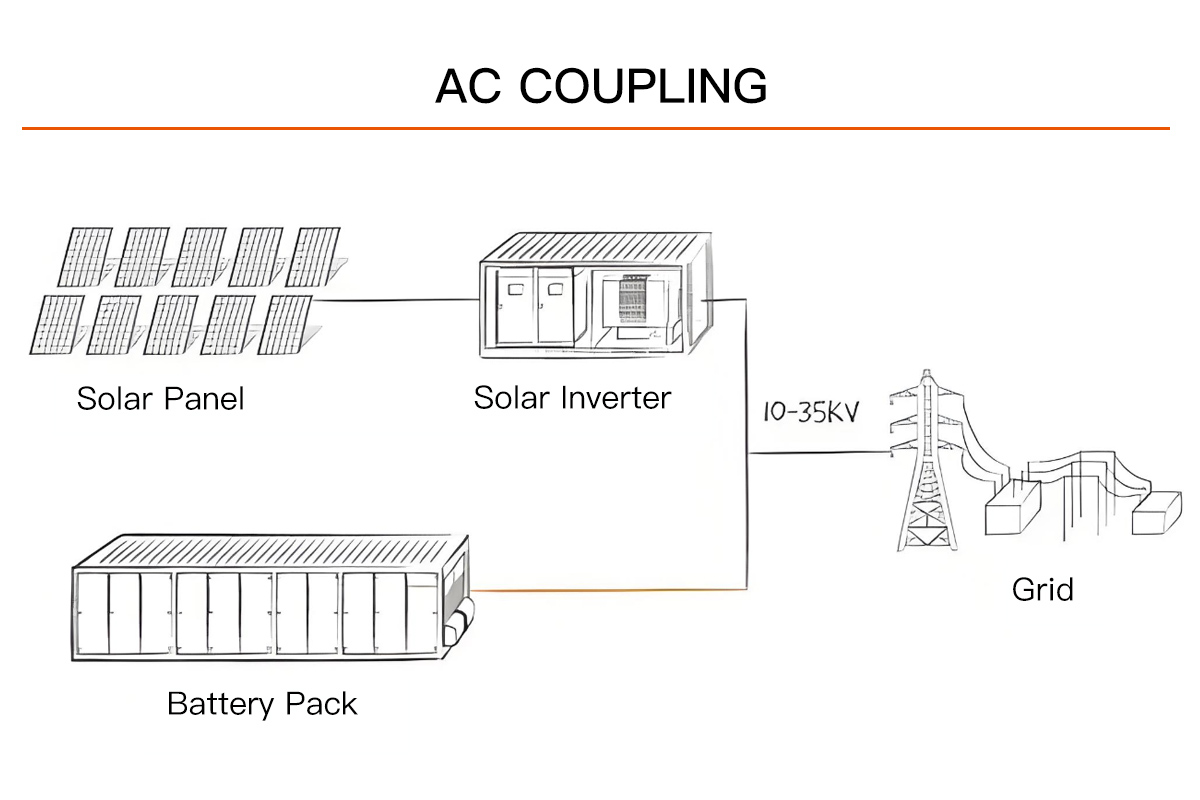Insolar battery storage systems, DC coupling and AC coupling define how solar panels, batteries, and the grid interconnect. Their core distinction lies in whether solar energy reaches the battery as direct current (DC) or alternating current (AC).
1. Core Principles & Energy Flow
DC Coupling
Principle: PV-generated DC power flows directly (or via a DC-DC converter) to a hybrid inverter, which:
Converts DC→AC for loads/grid.
Channels DC directly to batteries (DC→DC charging).
Energy Flow (Charging): PV (DC) → Hybrid Inverter → Battery (DC)
Key Advantage: Single conversion → higher efficiency.

AC Coupling
Principle: PV DC power first converts to AC via a PV inverter. For battery charging:
AC power must convert back to DC via a battery inverter (AC→DC).
Energy Flow (Charging): PV (DC) → PV Inverter (DC→AC) → Battery Inverter (AC→DC) → Battery (DC)
Drawback: Double conversion (DC→AC→DC) → efficiency loss.

2. Key Differences Summary
Feature | DC Coupling | AC Coupling |
Battery Charging Path | Direct DC (1 conversion) | DC→AC→DC (2 conversions) |
Efficiency | Higher (5-10% less loss) | Lower |
Key Equipment | Hybrid Inverter | PV Inverter + Battery Inverter |
Retrofit Ease | Difficult (replace existing PV inverter) | Easy (AC-side integration) |
Grid Outage Support | Requires specific hybrid inverter | Native microgrid capability |
Component Flexibility | Limited (brand compatibility) | High (mix-and-match brands) |
3. Pros & Cons
DC Coupling
✅ Pros: Higher efficiency, lower cost (new installs), compact design.
❌ Cons: Poor retrofit compatibility, vendor lock-in, high DC voltage risks.
AC Coupling
✅ Pros: Ideal for retrofits, flexible expansion, multi-vendor support.
❌ Cons: Lower efficiency, higher cost, complex coordination.
4. How to Choose?
DC Coupling vs. AC Coupling: Key Takeaways
Both DC coupling and AC coupling offer distinct advantages for PV-storage systems:
✅ DC Coupling excels in system efficiency and potential cost savings for new installations, making it ideal for high-performance solar-plus-storage projects.
✅ AC Coupling leads in deployment flexibility and retrofit-friendliness, serving as the go-to solution for adding storage to existing PV systems.
Choosing the right architecture depends on:
New build vs. retrofit
Budget constraints
Energy efficiency requirements
Future expansion plans
Space limitations
Brand preferences
Technological evolution continues:
DC-coupled hybrid inverters now offer enhanced battery compatibility and wider power ranges.
AC-coupled systems achieve improved control coordination and reduced conversion losses.


